I would much rather eat nutrient-dense real food than take a supplement. Why pay extra for a supplement (which has been packaged and shipped to you) when you could generate the same thing in your own kitchen from real food?!
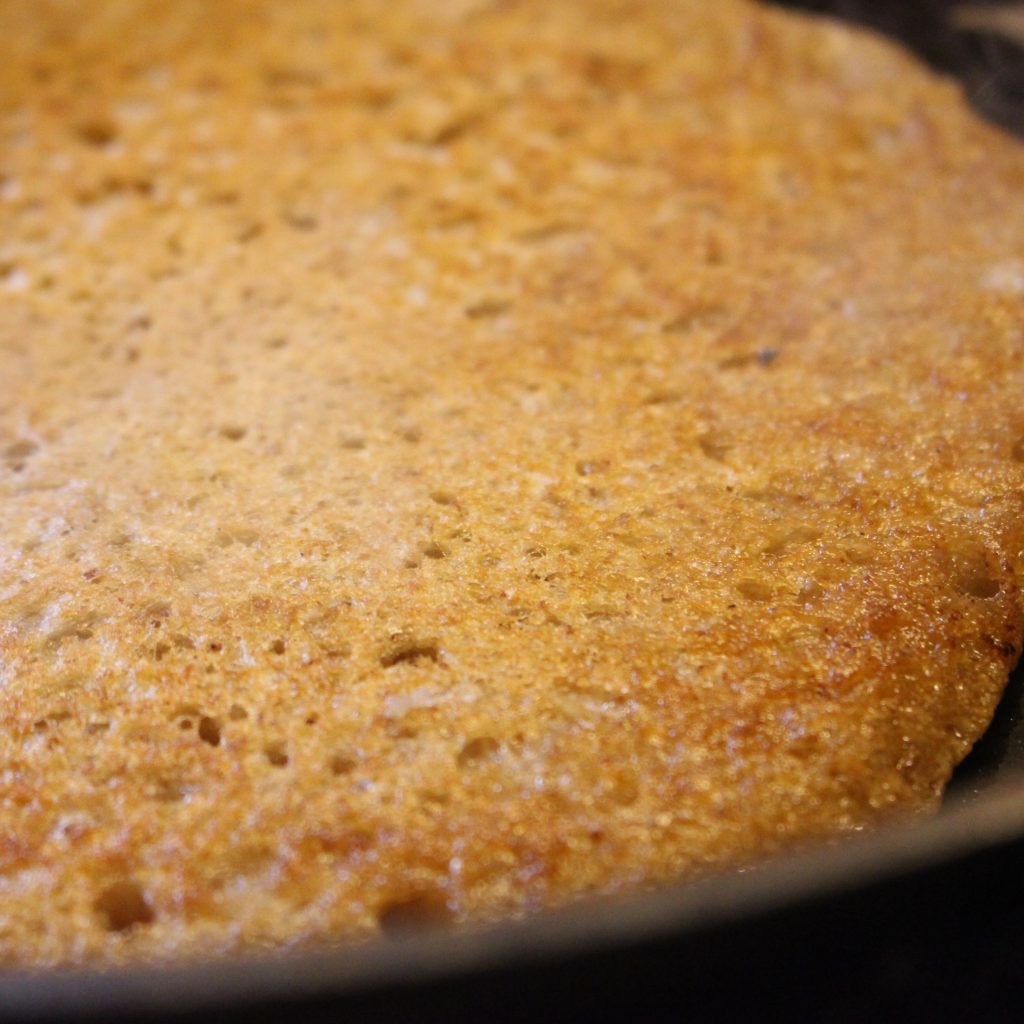
B vitamins (which many of us turn to to support our nervous system, keep us calm and enhance our sleep) are a great example of this. The delicious pseudo-grain, buckwheat (which is gluten-free) is, quite literally, nature’s vitamin-B tablet (if you look up what ‘natural’ vitamin B tablets are made from, it’s buckwheat) Buckwheat contains B3, B4, B5, B6, B9 & B12! And for even more nutrient-density, sprouting the buckwheat increases those vital B vitamins!
Rather than take a vitamin B supplement, I regularly sprout and ferment buckwheat into tasty, crisp pancakes. They are so good straight from the pan, covered in butter or grated cheese. Or you can fold them in half and stuff them with goodies!
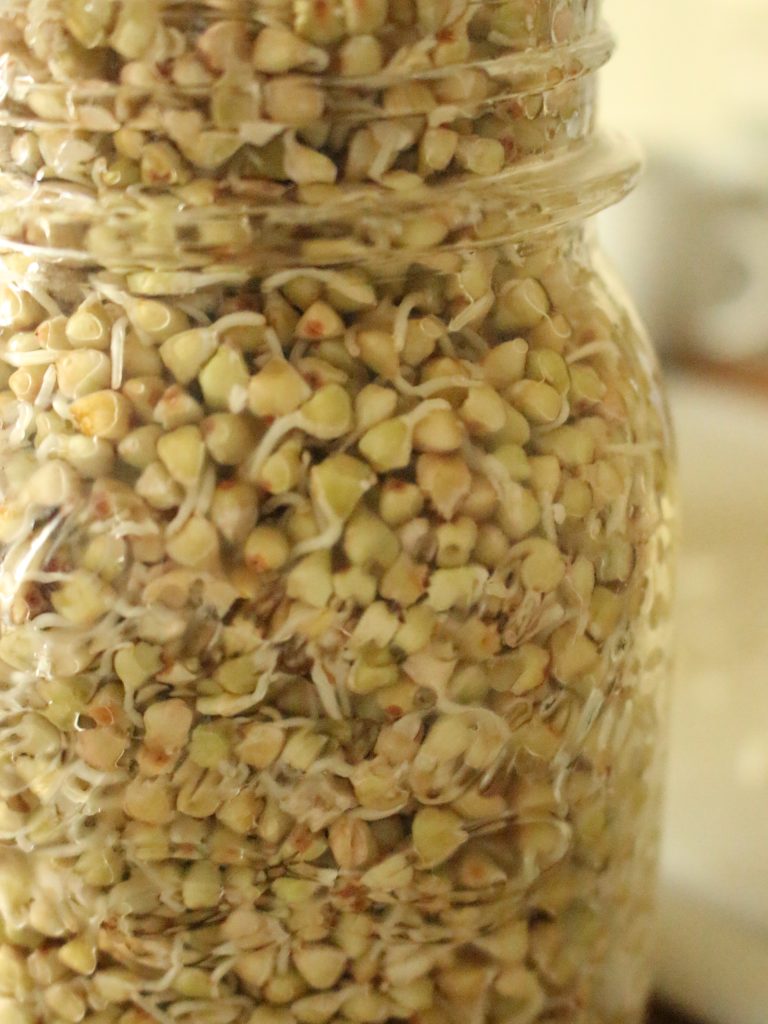
Sprouted Fermented Buckwheat Pancakes
(makes 4 pancakes, I cook these in a cast iron pan)
Ingredients:
200 g buckwheat (without hulls, it should look cream-coloured, like the picture above)
125 g non-chlorinated water
20 g sourdough starter (if you prefer you can use any other live culture – milk kefir, ginger bug, yoghurt et cetera)
Optional: You can jazz up these pancakes with many things – add spices or herbs, honey or a sprinkle of cheese. You could mix a couple of eggs into the batter just before cooking for a protein punch too!
Method:
- Sprout the buckwheat as per my instructions here.
- Blend the buckwheat with the water and sourdough starter (or other live culture) until smooth.
- Leave this mixture somewhere warm (ideally over 20C/68F). How long you choose to leave the mixture to ferment is up to you; the longer you leave it the more it will ferment and the more sour it will become. I like to leave mine 24 hours.
- When you are ready to cook, preheat your cast iron pan on medium until it is thoroughly warm. (This always takes longer than you think – I sometimes leave mine 15 minutes.) If, as me, you are using cast iron, the pan needs to be well-seasoned and thoroughly hot for the pancakes not to stick.
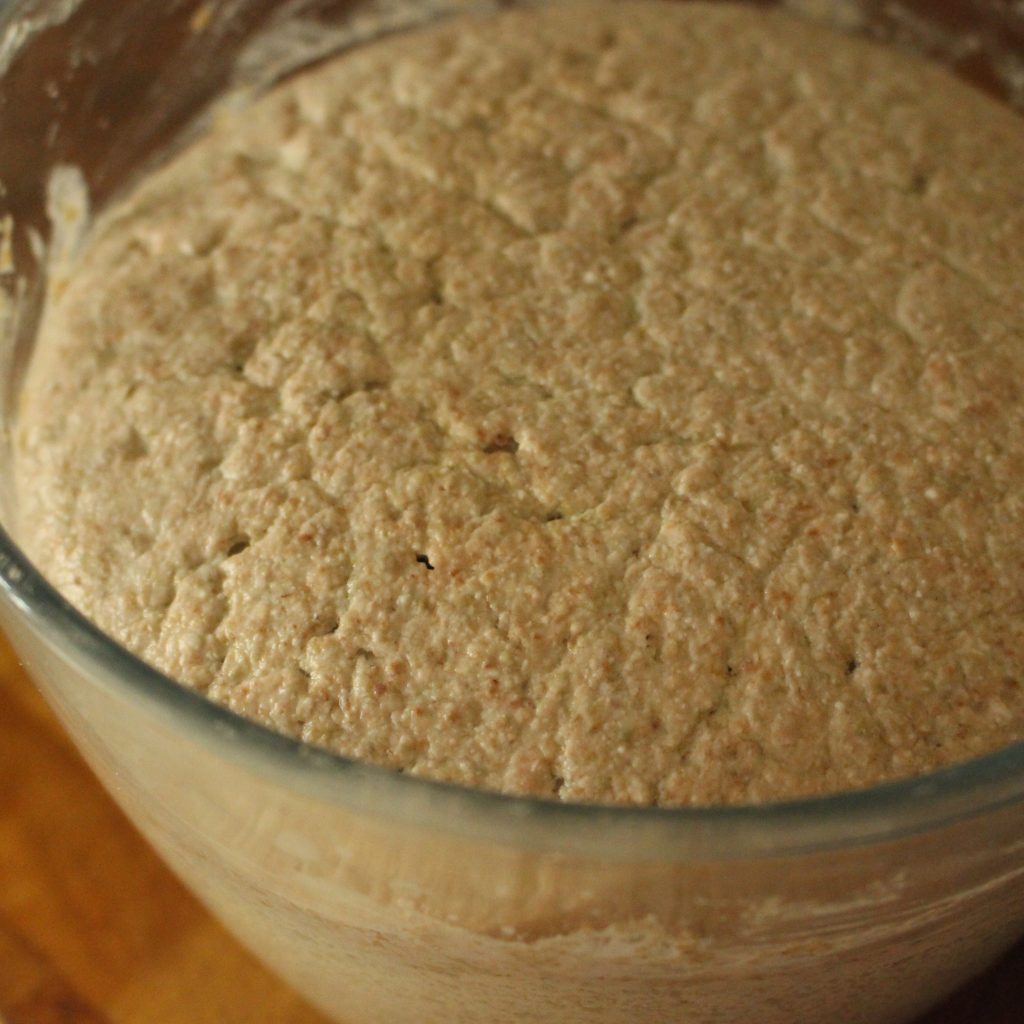
- Stir your fermented buckwheat mixture to redistribute the water. It may have separated quite a lot, it may have a pink tinge on its surface, and it may give off gases when you first stir it – all of these things are absolutely normal.
- Once your pan is hot, melt a good amount of fat (I use lard or ghee) in it and spoon some of the buckwheat mixture in, teasing it into a round shape using the back of your spoon.
- Leave to cook until upward facing surface of the pancake looks dry and has changed to a darker colour.
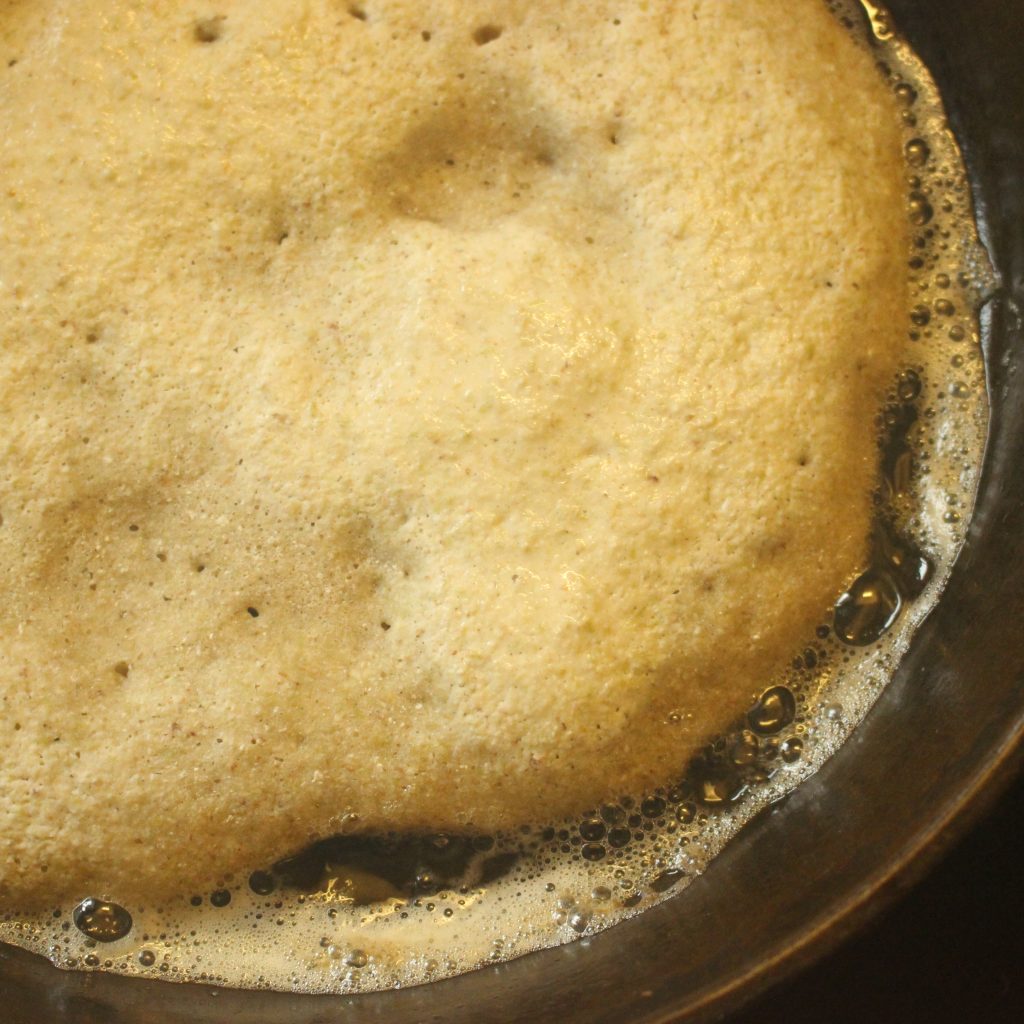
- Flip the pancake carefully, and cook until both sides are golden.
You can transfer the uncooked, fermented batter to the fridge before cooking – it’ll keep for 3/4 days. You can also use some of the old fermented batter to ‘start’ a new batch. Lastly, if you make more pancakes than you can eat. they’ll keep in the fridge and you can warm them up for a few minutes in a pan when you are ready to eat them!
You can also use this batter to make a delicious porridge – just heat it in a small saucepan, adding extra water/milk if needed and stir well until you get the consistency you like.
If you make these pancakes, I’d love to hear about and/or see the results! You can tag me on Instagram (@ancestral_kitchen), leave a comment below, or message me at alison(@)ancestralkitchen.com
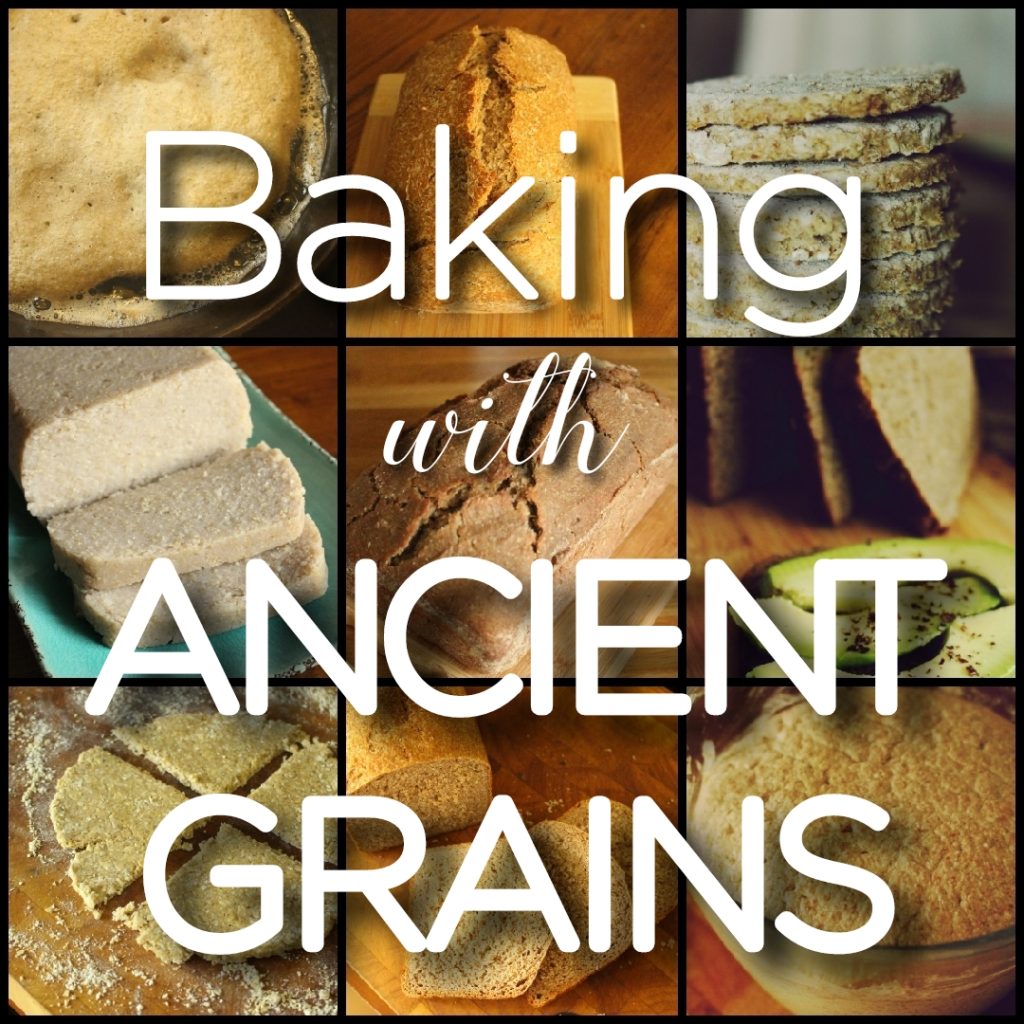
Bring ancient grain baking into your kitchen!
Download my free 30-page guide with five healthy and tasty 100% ancient grains recipes.


Can the body ecology starter be used?
Veggie Culture Starter
Hi Al,
I haven’t used a bought starter before so can’t be 100% sure, but it’s yeast/bacteria designed to ferment so I think so!
I love this recipe, am just about to experiment with it now. One question – what do you think about the risks of accidentally cultivating e.coli or some other undesirable bacteria during the sprouting of the buckwheat grain? I’d hope that the fermentation and cooking would eliminate it but seen quite a bit about it recently on the internet.
Just discovered your site, ancestral cooking and Nourishing Traditions – very excited to dig into this wealth of information!
Hi Tom!
Interesting question. I’ve been sprouting regularly for over a decade and never had a problem. I get organic grains, rinse well and regularly (with buckwheat that’s twice a day and three/four times each rinse) and ensure they can drain well. If there’s ever an off smell – it’s kinda of a ‘musty’ scent – I throw the sprouts away.
I hope this helps. Good luck with your ancestral journey!
Please clarify this recipe. I have got to the point of mixing the sprouted 200 gr of buckwheat with the other ingredients, doesn’t look like enough for 4 pancakes? It’s been sitting covered all day, looking the same, as when it was mixed with a spoon in the early morning, (used sourdough starter)… Does the latter need to be blended with an immersion blender?
I sprouted approx 4 cups buckwheat total, of which the rest (minus 200g) is in the fridge. What is done with that? Do you need to continue washing & draining it?
The recipe starts with 200g dry, unsprouted buckwheat. The pancakes have 50g of buckwheat (which has then been sprouted) in each. If you’d like your pancakes bigger, feel free to use more.
Ideally you pop the starter in with the sprouted grains and water before you blend…but it’s also fine to stir in the starter after blending just the buckwheat and water (which is what it sounds like you have done). As long as your environment is not cold and your starter active, it will ferment, even if it doesn’t look different.
If you sprouted extra buckwheat, keeping it in the fridge will be fine for at least 4/5 days but yes, you should rinse and drain it at least once a day.
Hi can I use this recipe to make bread ? Thanks
Good question. I used to make a very simple buckwheat bread from blended, fermented grains and it worked really well. I have not tried it with sprouted grains, but I bet it’d work, so do have a go. I would reduce the water a little though to make a thicker batter.
Can I use yeast to ferment my buckwheat?
I have never done this, preferring to use a wild starter that’s a mixture of yeast and bacteria, but I don’t see why you could not, I’m sure it would work.